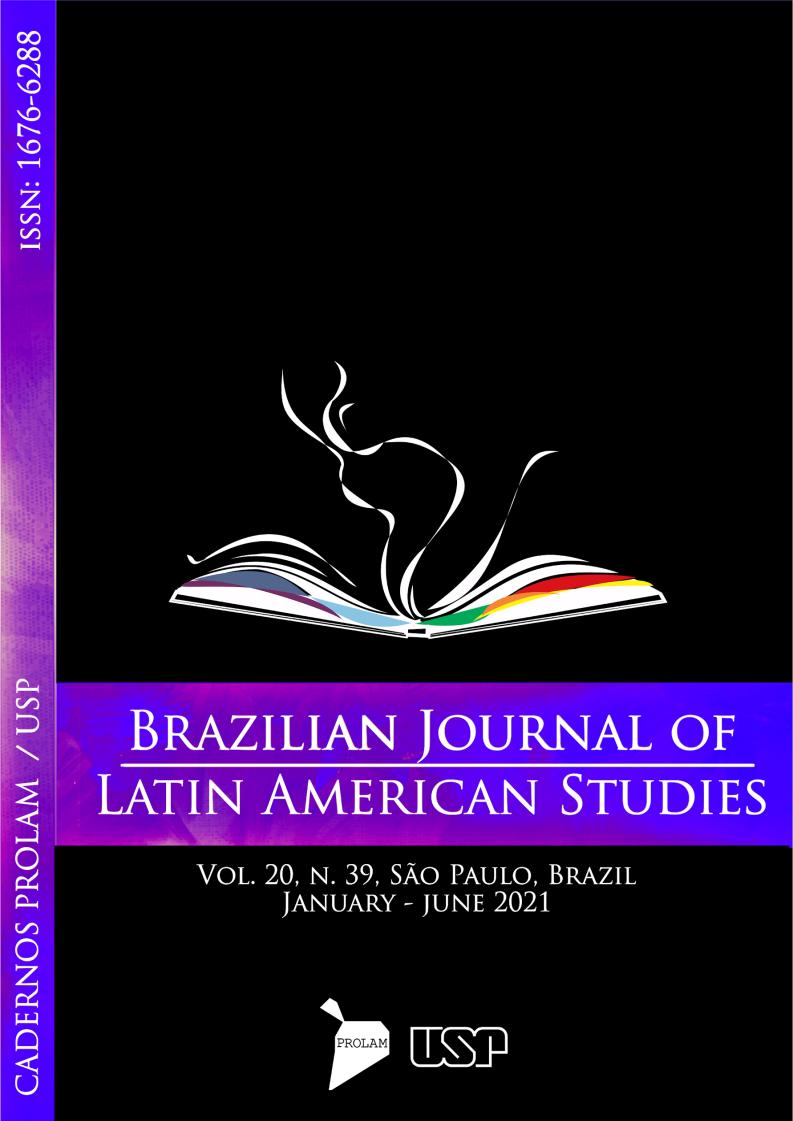Bolívar Echeverría: Latin American baroque modernity
DOI:
https://doi.org/10.11606/issn.1676-6288.prolam.2021.174267Keywords:
Modernities, Ethos, Baroque, Codigophagy, Company of JesusAbstract
The Ecuadorian / Mexican philosopher and sociologist Bolívar Echeverría develops an original theory within Latin American critical Marxism, starting from the contradiction between use value and exchange value, a contradiction that in the times of contemporary capitalism means generating a concrete and particular ethos or behaviour that allows us to live objectively and subjectively the unlivable, capitalism. The philosopher finds different modernities that are dialectically linked to the concrete ethos that arise spontaneously to live the contradiction posed by the hegemony of capitalism in the world of life located in different historical periods: realistic, romantic, classical and baroque modernity. The latter being the particular type in which Latin American societies experience contemporary capitalism, a configuration product of the unique historical evolution of our societies, mainly what happened during the XVI and XVII centuries, in the process of constitution of a global capitalist colonial system. His gaze inquiries about our being, our constitution and the desperate search for alternative modernities to the capitalist. In this article a critical dialogue is carried out with and about the theory proposed by the author on Baroque Modernity as the singular form of reproduction of the life of Latin American societies in contemporary capitalism. The present investigation is reproduced between the heterodox Marxism of Latin America and the influence of the critical theory of origin in Frankfurt.
Downloads
References
ADORNO, Theodoro; HORKHEIMER, Max. Dialéctica de la Ilustración. Madrid: Akal, 2007 [1944]. ISBN: 978-84-460-1677-9.
ADORNO, Theodoro. La Teoría Estética. Lisboa: Akal, 2004 [1970]. ISBN: 84-460-1670-2.
BENJAMIN, Walter. La obra de arte en época de su reproductibilidad técnica. Buenos Aires: Ed. Godot, 2019 [1936]. ISBN: 978-987-4086-71-6.
BENJAMIN, Walter. Las Tesis de la Filosofía de la Historia. Barcelona: Angelus Novus. 1971 [1940]. Disponible en: https://adultosmayores.unr.edu.ar/wp-content/uploads/2020/11/Benjamin-Walter-Tesis-de-Filosofia-de-la-Historia.pdf . Accedido en 18 jun. 2021.
BENJAMIN, Walter. Origen del drama barroco Alemán. Madrid: Abada. 2006 [1925]. ISBN: 9788496258594
ECHEVERRÍA, Bolívar. El discurso crítico de Marx. México: ERA, 1986. ISBN: 968-411-151-7.
ECHEVERRÍA, Bolívar. La modernidad de lo Barroco. México: ERA, 1988. ISBN: 968.411.427.3.
ECHEVERRÍA, Bolívar. Circulación capitalista y reproducción de la riqueza social. México: Ediciones Nariz del Diablo, 1994. ISBN:9978-82-554-1.
ECHEVERRÍA, Bolívar. Imágenes de la blanquitud. En P. L. Bolívar Echeverría (Autor), Sociedades Icónicas (págs. 145-160). México: Siglo XVI. (2007). ISBN-10 : 9682326737
ECHEVERRÍA, Bolívar. Juego, arte y fiesta. Juego, arte y fiesta. Quito: Flacso, 2002.
ECHEVERRÍA, Bolívar. Arte y utopía. México: Itaca, 2003. ISBN: 1570-1522.
ECHEVERRÍA, Bolívar. Vuelta de Siglo. Caracas: El perro y la rana, 2005. ISBN: 978-980-396-600-3.
ECHEVERRÍA, Bolívar. Definición de la Cultura. México: Itaca, 2010. ISBN: 6071601819, 9786071601810
ECHEVERRÍA, Bolívar. Antología, Bolívar Echeverría, Crítica de la Modernidad Capitalista. La Paz: Vicepresidencia del Estado Plurinacional de Bolívia, 2011. Disponible en: http://comunizar.com.ar/wp-content/uploads/Echeverria-Bolivar-Critica-De-La-Modernidad-Capitalista.pdf . Accedido en 18 jun. 2021.
FREUD, Sigmund. El malestar en la cultura. Madrid: Akal, 2017 [1930]. ISBN: 978-84-460-4385-0.
GRACIÁN, Baltazar. El criticón. Madrid: Verbum, 2020. Disponible en: https://qeef144wre.pdcdn.xyz/dl2.php?id=193325756&h=913e093893a6d2b01e508a365853debf&u=cache&ext=rtf&n=El%20criticon . Accedido en 18 jun. 2021.
HARNECKER, Marta. El capital: conceptos fundamentales. Santiago de Chile: Editorial Universitaria. 1971. Disponible en: https://rebelion.org/docs/88241.pdf . Accedido en 18 jun. 2021.
RAMOS, César Miguel Salinas. Bolívar Echeverría: “Modernidad Barroca Latinoamericana. Ouro Preto: Universidade Federal de Ouro Preto. 2020. Disponible en: http://www.repositorio.ufop.br/handle/123456789/12085. Accedido en 18 jun. 2021.
SÁNCHEZ VÁSQUEZ, Adolfo. Filosofía de la praxis. México: Siglo XVI. 2003 [1967]. ISBN 968-23-2410-6
SIERRA, Wladimir. Palestra presentada en el Simposio Bolívar Echeverría y la Teoría Crítica Latinoamericana. Teoría Crítica Excéntrica: Valor de Uso y Utopismo. Quito, Pichincha: Revista Sophia. 19 junio 2010. Disponible en: https://www.youtube.com/watch?v=W5TmitrXkK0 . Accesado en: 15 maio 2021.
TOLSTOI, León. La muerte de Ivan Ilich. Madrid: Mestas Ediciones, 2002. ISBN: 978-80-268- 0692-9.
WEBER, Max. La ética protestante y el espíritu del capitalismo. México: Premia, 1991 [1905]. ISBN:968-607-16-1150-5.
Downloads
Published
Issue
Section
License
Copyright (c) 2021 César Miguel Salinas Ramos

This work is licensed under a Creative Commons Attribution-NonCommercial-NoDerivatives 4.0 International License.
A BJLAS adota a política de Acesso Livre (Libre Open Access), sob o acordo padrão Creative Commons (CC BY-NC 4.0). O acordo prevê que:
- A submissão de texto autoriza sua publicação e implica compromisso de que o mesmo material não esteja sendo submetido a outro periódico. O original é considerado definitivo;
- Autores mantêm os direitos autorais e concedem à revista o direito de primeira publicação, com o trabalho simultaneamente licenciado sob a Licença Creative Commons Attribution (CC BY-NC 4.0).
- Autores têm autorização para assumir contratos adicionais separadamente, para distribuição não-exclusiva da versão do trabalho publicada nesta revista (ex.: publicar em repositório institucional ou como capítulo de livro), com necessário reconhecimento de autoria e publicação inicial nesta revista;
- Autores têm permissão e são estimulados a publicar e distribuir seu trabalho online (ex.: em repositórios institucionais, repositórios específicos, ou na sua página pessoal) após o processo editorial, já que isso pode gerar alterações produtivas, bem como aumentar o impacto e a citação do trabalho publicado (Veja O Efeito do Acesso Livre).
- O detentor dos direitos autorais da revista, exceto os já acordados no acordo sob a Licença Creative Commons Attribution (CC BY-NC 4.0), é o Programa de Pós-graduação Integração da América Latina.
É permitida a cópia, reprodução e distribuição de textos, imagens, dados e demais arquivos, no todo ou em parte, em qualquer formato ou meio, desde que sejam observadas as regras da licença Creative Commons (CC BY-NC 4.0):
- O uso do material copiado e ou reproduzido no todo ou em partes deve se destinar apenas a fins educacionais, de pesquisa, uso pessoal ou outros usos não comerciais. Reproduções para fins comerciais são proibidas;
- O material pode ser copiado e redistribuído em qualquer suporte ou formato;
- A reprodução deverá ser acompanhada da citação da fonte na integra incluindo o(s) nome(s) do(s) aturoes(s), no seguinte formato: Fonte: Revista Cadernos Prolam/USP. Brazilian Journal of Latin American Studies;
- Os nomes e endereços informados na revista serão usados exclusivamente para os serviços prestados por esta publicação, não sendo disponibilizados para outras finalidades ou a terceiros.




